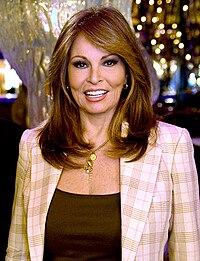Raquel Welch
(1968), 100 Rifles (1969), Myra Breckinridge (1970), Hannie Caulder (1971), Kansas City Bomber (1972), The Last of Sheila (1973), The Three Musketeers (1973), The Wild Party (1975), and Mother, Jugs & Speed (1976).
Through her portrayal of strong female characters, helping her break the mold of the traditional sex symbol, Welch developed a unique film persona that made her an icon of the 1960s and 1970s.
[4] She won a Golden Globe Award for Best Motion Picture Actress in a Musical or Comedy in 1974 for her performance as Constance Bonacieux in The Three Musketeers and reprised the role in its sequel the following year.
Welch was born Jo Raquel Tejada on September 5, 1940, in Chicago, Illinois, and moved to San Diego,[5][6] California, at age two with her family.
[7][8] Her mother was of English descent with ancestors tracing back to the Mayflower; she was the daughter of Clara Louise Adams and architect Emery Stanford Hall.
[23][21] Seeking an acting career, she entered San Diego State College on a theater arts scholarship,[24] and the following year she married her high school sweetheart, James Welch.
After her separation from James Welch, she moved with her two children to Dallas, Texas, where she made a "precarious living" as a model for Neiman Marcus and as a cocktail waitress.
That same year, she won the Deb Star while her photo in a Life magazine layout called "The End of the Great Girl Drought!"
[27] She was strongly considered for the role of Domino in Thunderball[28] and was also noticed by the wife of producer Saul David, who recommended her to 20th Century Fox, where with the help of Curtis she landed a contract.
[34] One author said, "although she had only three lines in the film, her luscious figure in a fur bikini made her a star and the dream girl of millions of young moviegoers".
[41] Reviewing her performance, the Los Angeles Times film critic said that "each new Raquel Welch picture brings further proof that when Maria Montez died they didn't break the mold.
The film provoked publicity and controversy at the time because it included a love scene between Welch and Brown that breached Hollywood's taboo against onscreen interracial intimacy.
[63] In a 2012 interview with GQ, Welch reflected on the roller derby world depicted in the film: "You have all those women out there, but the men in the front office are really running it.
Welch was offered the title role in Alice Doesn't Live Here Anymore (1974), which earned an Oscar for its eventual star Ellen Burstyn; she also turned down the chance to play Honey Bruce in the biographical film Lenny (1974), a part that went to Valerie Perrine.
[70] In the summer of 1982, Welch was among the candidates considered for the role of Alexis Carrington on the ABC primetime drama Dynasty, along with Elizabeth Taylor and Sophia Loren, before the producers settled on Joan Collins.
[74] In the Season 2 episode "Top Copy", Welch played a television reporter and assassin who threatens to expose Clark's identity as Superman.
[74][75] In 1996, Welch joined the cast of the night-time soap opera Central Park West, after CBS had already slated it for cancellation, as creator Darren Star made a final attempt to save the show by boosting its ratings late in its first season.
[77] Welch acted in the Season 8 finale of the comedy series Seinfeld, titled "The Summer of George" (1997), playing an exaggerated and highly temperamental version of herself.
[78] Entertainment Weekly wrote, "By delivering a pitch-perfect performance as a fire-breathing prima donna, Welch also poked fun at her reputation (fairly earned or not) for being difficult to work with.
[82] Welch played the mother-in-law of Barry Watson's character in a Canadian sitcom titled Date My Dad (2017) where she reunited with Robert Wagner on screen, five decades after starring together in The Biggest Bundle of Them All.
[88] In 1994, Welch made a cameo appearance in Naked Gun 33+1⁄3: The Final Insult, in the scene where Leslie Nielsen's character crashes the Academy Awards.
[90] Also that year, Welch appeared in Tortilla Soup, a family comedy-drama inspired by Ang Lee's Eat Drink Man Woman, playing Hortensia, a domineering mother determined to marry the master chef who thinks he is losing his sense of smell and taste.
Theatre critic Jamie Portman wrote that her glamor made Welch "scarcely believable as the vulnerable Victoria and totally unbelievable as the swaggering tuxedoed Victor", but that she at least "earns high marks for valor" for attempting to breathe life into "the misbegotten musical version of Victor/Victoria".
The book, written by Welch with photographs by André Weinfeld, includes a hatha yoga fitness program, her views on healthy living and nutrition, as well as beauty and personal style.
[107] In 1996, after keeping a low romantic profile for several years, she dated former British boxing champion Gary Stretch, who was younger than both of Welch's children.
Palmer, who had one son from a previous marriage, broke off his engagement with business partner and actress Cathy Moriarty to pursue Welch in October 1997.
[120][121] Welch was Presbyterian, the religion of her childhood, and had said, "I remembered the wonderful sense of peace I'd felt when sitting under the protection and grace of my mother's faith."
Hugh Hefner later wrote, "Raquel Welch, one of the last of the classic sex symbols, came from the era when you could be considered the sexiest woman in the world without taking your clothes off.
Her beautiful looks and eroticism made her the definitive 1960s and 1970s sex icon, rather than the blonde bombshell of the late 1950s as typified by Marilyn Monroe, Jayne Mansfield, and others.
In the 1994 film The Shawshank Redemption, the poster that Andy Dufresne had on his prison cell wall at the time of his escape was the famous pinup image of Welch in One Million Years B.C..[148]








